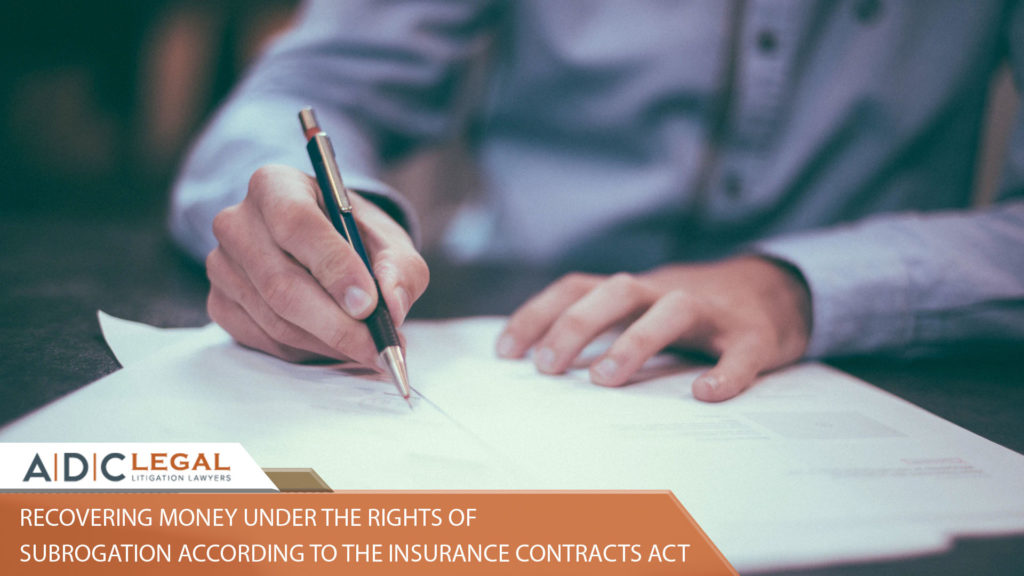
Author : Suganyaa Vishnuraj
Part 8 of the the Insurance Contracts Act 1984 (Cth) (“ICA”) governs subrogation within the context of insurance law. In short, subrogation within the context of insurance law, allows for an insurer to assume the rights and duties of an insured in order to bring a claim against a third party who has caused loss to the insured.
Insurers exercising their rights of subrogation
To provide an example of how subrogation works we will consider an instance whereby an insured driver is involved in a motor vehicle accident through no fault of their own. In such an instance, the insurance company will pay for the repairs of the insured’s motor vehicle. The insurance company will then make a claim against the at fault third party, under the name of the insured, in order to recover the loss it has incurred. This example provides a simple situation of how the ICA allows insurers to recover for loss under their rights of subrogation.
In The Owners Strata Plan 56587 v TMG Developments Pty Limited [2007] NSWSC 1364, the Court considered whether the insurer would be entitled to a right of subrogation to the rights of the Owners Corporation (being the insured). In considering whether the insurer had a right to subrogation, the Court made consideration to the Policy between the insured and insurer. The Court found that the Policy in place between the insurer and the insured confirmed the insurers rights of subrogation, which then allowed the insurer to initiate the claim under the name of the Owners Corporation.
Regardless of the rights of subrogation as provided under the ICA, this case example demonstrates the importance of ensuring the Policy between an insurer and insured confirms the insurers rights of subrogation.
Limiting the ability of insurers to exercise their rights of subrogation
The ICA regulates the ability of insurers to make a claim against certain third parties. For example, it is expected that insurers will not exercise their rights of subrogation for reasons such as a family or other personal relationship between an insured and the third party, or, the insured having provided express or implied consent for the third party to use an insured motor vehicle.[1]
Further, section 66 of the ICA which covers subrogation of rights against employees, limits the ability of insurers to recover damages from the employee of an insured.
According to section 66, the insurer does not have the right to subrogation to the insured against the insured’s employee where the loss caused by the employee has occurred during the course of employment and the actions of the employee was not “serious or wilful misconduct”.[2]
The case of Boral Resources (Queensland) Pty Ltd v Pyke (1989) 93 ALR 89 considered and commented on “serious and wilful misconduct” stating ““Wilful” misconduct involves merely the doing of acts in fact amounting to misconduct intentionally, with knowledge that those acts will amount to misconduct.’”.[3]
This leads us to question, if the employee is fired by the employer after an incident causing loss to the insurer and/or insured, can the insurer then exercise their rights of subrogation to bring a claim against the employee. In short, the insurer cannot bring a claim against an employee even after they are fired, if at the time the incident took place, they were an employee acting in the course of their employment.
Email: email@adclegal.com.au
Call Us: +1300 799 820 820
This reinforces that in some instances, an insurers rights of subrogation are limited. Section 66 is a prime example which provides that, as long as employees are acting in the course of their employment, section 66 restricts insurers from their right to subrogation to bring a claim they may have had otherwise.
Distributing proceeds from a claim
Section 67 of the ICA applies in instances where an amount is recovered (either by the insured or the insurer) from a third party in respect of loss, in instances where an insurer is liable under a contract of insurance and the insurer has a right of subrogation with respect to the loss.[4]
The way in which proceeds from a recovery action are distributed are based upon the following:
- Administrative and legal costs claimed within a proceeding are to be distributed to the party bringing the claim, and in instances where both the insurer and the insured are involved in bringing the claim, it is to be distributed accordingly or pro rata if there are insufficient funds;
- The remaining recovered funds are distributed according to the party who brought the claim as follows:
- If the insurer is bringing the action, the insurer will receive an amount equal to the amount that it has paid to the insured under the insurance contract, with any remaining funds going to the insured;
- If the insured is bringing the action, the insured will receive an amount equal to the loss that has been suffered, with any remaining funds going to the insurer;
- Similar to above, if the insurer and insured are bringing the claim jointly, they will each be reimbursed an amount equal to their loss, or pro rata if there are insufficient funds.[5]
Conclusion
The above consideration of Part 8 of the ICA highlights the important role it plays in allowing insurers to recover loss from a third party. Through rights of subrogation, insurers have the ability to pursue third parties for loss that arises out of an insurance contract with an insured. Moreover, through the operation of the rights of subrogation, both insurers and their insured are prevented from making a double recovery in a claim.
[1] Insurance Contracts Act 1984 (Cth) s 65(1)(c).
[2] Ibid s 66.
[3] Boral Resources (Queensland) Pty Ltd v Pyke (1989) 93 ALR 89, 115.
[4] Ibid s 67(1).
[5] Explanatory Memorandum, Insurance Contracts Amendment Bill 2010 (Cth).
Contact us:
To get a better understanding of the process of responding to any claims made against you please feel free to contact our team at ADC Legal Litigation Lawyers on 1300 799 820 or email them at email@adclegal.com.au.
Email: email@adclegal.com.au
Call Us: +61 1300 799 820

